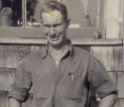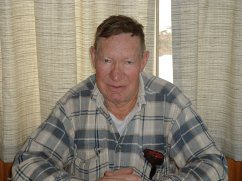| Bob did not hear about the attack on Pearl Harbor until Monday, Dec. 8 at his night school class at Cusick High School, as his family did not own a radio. The attack seemed very far away to him, as it did many from the Pend Oreille Valley. |
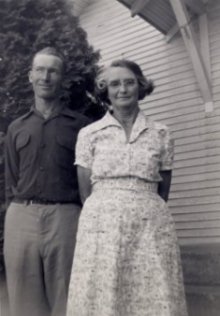 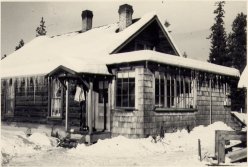
|
| Bob and his mother Lottie, the Rednour cabin on the right |
| In 1945 he was sent in to receive his physical, along with 13 other guys from the Usk area. Two of those that went in with him failed their examinations due to high blood pressure, brought on by a shot that a veterinarian father gave them. This same father offered on the way into Spokane, to "do the same for the rest." None of them took him up on his offer though. |
| Imagine 300 guys running around the top 2 floors of of the Murphy Building downtown Spokane with very little on, being sent room to room for each part of the physical, and they checked everything. When that was done they sent you to a room where your officer was - mine was a Navy officer (since I was to go into the Navy) - who asked questions like: If I was able to write letters home, and if I could handle life aboard a ship. I was fully able to write letters, I never really had had to write a letter, but I could. |
| I was supposed to go into the Navy but my father Roy, went down to to draft board in Newport and raised such a stink about me being needed back here on the ranch, that the board gave me a deferment. |
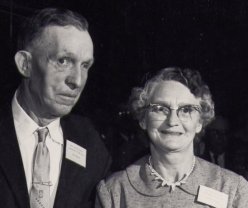 |
| Roy Rednour and wife Lottie |
| DID YOU WISH YOU HAD GONE INTO THE NAVY? |
| I kind of would have liked to have gone, I'm not sure I would have liked the boat though. It was hard when my friends came back and talked about their experiences though. |
| DID YOU EVER GET HARASSED ABOUT NOT SERVING? |
| Yes, some. There was this one man at the Usk Tavern that said, "Yeah, you know Bob is staying home so he can take care of the chickens." That hurt, because I wanted to go and fight, but my dad ran everything, and I didn't have a choice but to stay home. Of course, I understand his beef, he had 2 sons over fighting the war, so I don't blame him for saying that. |
| ESSENTIAL WORK AND THIS AREA |
| Agriculture |
| The beef we raised was designated for the Armed Forces. Everything taken to Stockland (the stock yards) had to be reported to the government so we couldn't really just sell meat to anyone. |
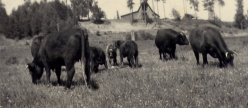 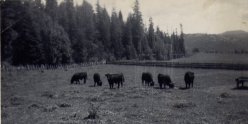 |
| Cows and bulls below the road and in the field at the Roy Rednour and Son Ranch |
| Lumber |
| During the war the mills in Cusick (Diamond Match) were the only major mills running, since the mill at Dalkena burned in 1936. When the war started everyone working in the mills and woods were frozen on their job. There was such a high demand for lumbr that the industry became essential. Everyone over 18 still had to register with the War Department though. |
| The mills didn't have to advertise for workers, there was a standing list of people that wanted in. This made it easy for the mills, because they could be very selective on who they hired. They, like the mines kept places for those servicemen that came back from the war. |
| The Mines |
| They were going full blast. All of the workers, like the mills were frozen to their jobs, and like the mills employed a lot of people throughout the war. |
| WHAT WAS THE HARDEST THING TO GO WITHOUT DURING RATIONING? |
| Sugar, meat, coffee were the hardest. To replace sugar we mixed in other things like honey when we didn't have enough. We did trade stamps to get more of what we needed. The coffee ration was especially hard on my folks, they traded stamps all the time to get coffee. |
| We did pretty good on gas and diesel, but we did have to apply for it though. It was easier to get than others because we were part of an essential industry. |
| Rubber tires were really hard to get, we had to go to the Ration Board, and tell them why we needed them. One time we got a new tire for the pickup in Spokane. Then, coming down Cook's Mountain the brand new tire blew. I had to go back to the Ration Board, and tell them what happened so that the tire could be replaced. We baled hay for people in the area, but the problem was that we only had steel wheels on the baler (pretty tough on roads and the baler in transit), and we needed tires for our 3 hay trailers too. Dad went to the Ration Board to ask for tires, and between he and Fred Schwab (who we were putting hay up for), we got 10 tires. |
| Meat was a little hard go without, although we ate a lot of chicken and rabbit. We couldn't really butcher our own beef, because it was all supposed to go to the military. To this day I don't like the taste of rabbit. |
| THE KUBOTA FAMILY |
| The Kubota family in Newport had a laundry, and the Kubota family of Metaline Falls ran a merchantile. They, like all the other Japanese-Americans were supposed to be sent to a relocation camp, but the Metaline Falls and Ione communities went to their defense and insisted they were harmless, so the government allowed them to stay. The Newport family was also allowed to stay, after the community went to their defense. Francis Kubota, son of the Metaline Falls family, was accepted into the Army after restrictions were eased, allowing Japanese-Americans into military service. |
| CONSCIENCIOUS OBJECTORS |
| Many consciencious objectors served their country in the medical corps, one of which was Emil Dalke, Newport High School graduate that gave his life in Italy. Those that did not serve were often put to work in essential industries, such as the mines in North Pend Oreille County. There were some however, that were placed in camps or prison, such as the camp out by Spokane's V-Lock (now Industrial Park), or like Erven Clarence Hoener, a Jehovah's Witness from the Pend Oreille Valley who was sentenced to 1 year in Federal Prison. Those objectors kept at the V-Locks were pretty much locked in, and there were some allowed to work, and some not. But by and large, as Bob said, We didn't hear much about them. |
| WHAT DO YOU REMEMBER MOST ABOUT THE WAR YEARS? |
| Haying on the island in the river, and the big planes (B-17s and B-24s) flying overhead, from out of Felts Field in Spokane. You could hear them over the tractor and baler, which by themselves were really loud. Their training missions were never really a secret, we knew what was going on. Also, all the years of being quiet about everything. We didn't tell about troop movements, even if we knew from letters from overseas. We didn't give up anything that would help the enemy. |
| WHAT ABOUT THE CELEBRATIONS FOR V-E AND V-J DAY? |
| No big celebration in Newport for V-E Day, or V-J Day really. I went in to get gas on V-J Day, and found out at the gas station that the war was over, and there was no more rationing. It was quite the news, now we could say 'Fill 'er up' again. So I went home to tell my father the news. |
| WHAT DO YOU MISS? |
| It was nice it was over, now we could go back to living a civil life again, because it had gotten too complicated. |
| POST-WAR PEND OREILLE VALLEY |
| Timber and the mines thrived for years afterward because of the building boom that came with suburbia. |
| THOUGHTS ON THE ATOMIC BOMB |
| Didn't do wrong by dropping it. It didn't do as much damage as the other conventional bombing before it, when there were 1000 planes dropping bombs a raid. Yes it was definately justified after Pearl Harbor. |
| POST-WAR LIFE |
| In 1956, Bob met Norma Schirmer on a blind date set up by Ted and Dory Schwab (Norma's sister). Norma's first husband Dick had died in 1954, leaving her to raise 4 children on her own. They were married on July 26, 1956, and raised 3 more children of their own. My grandparents recently celebrated their 47th wedding anniversary. |
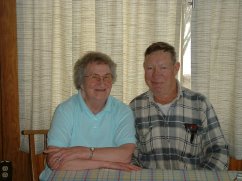 |
| Bob and Norma Rednour, 2004 |
